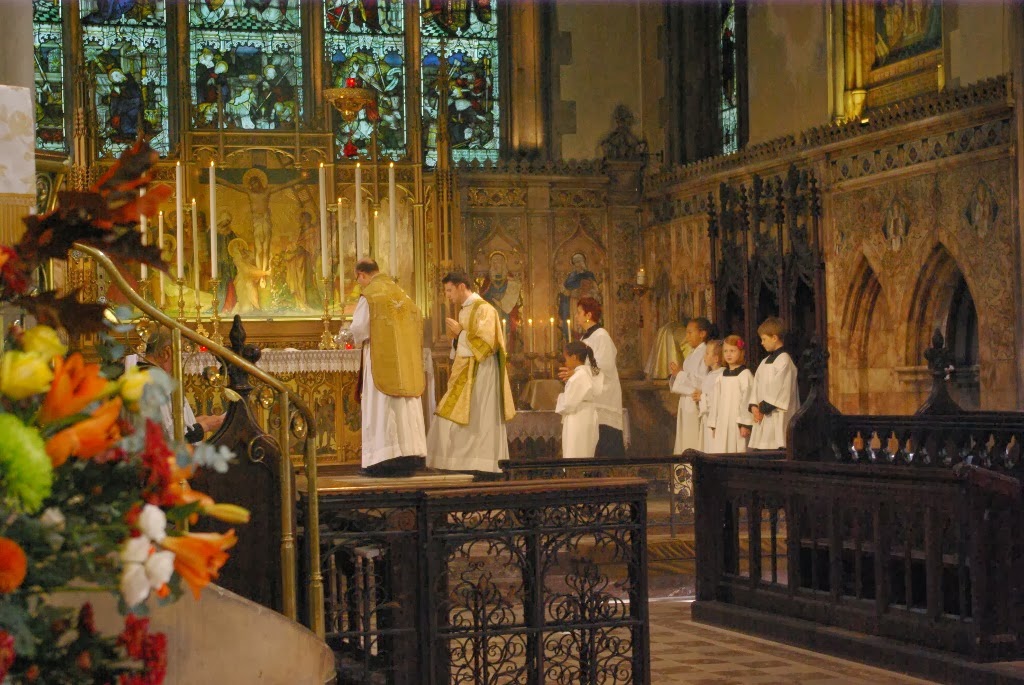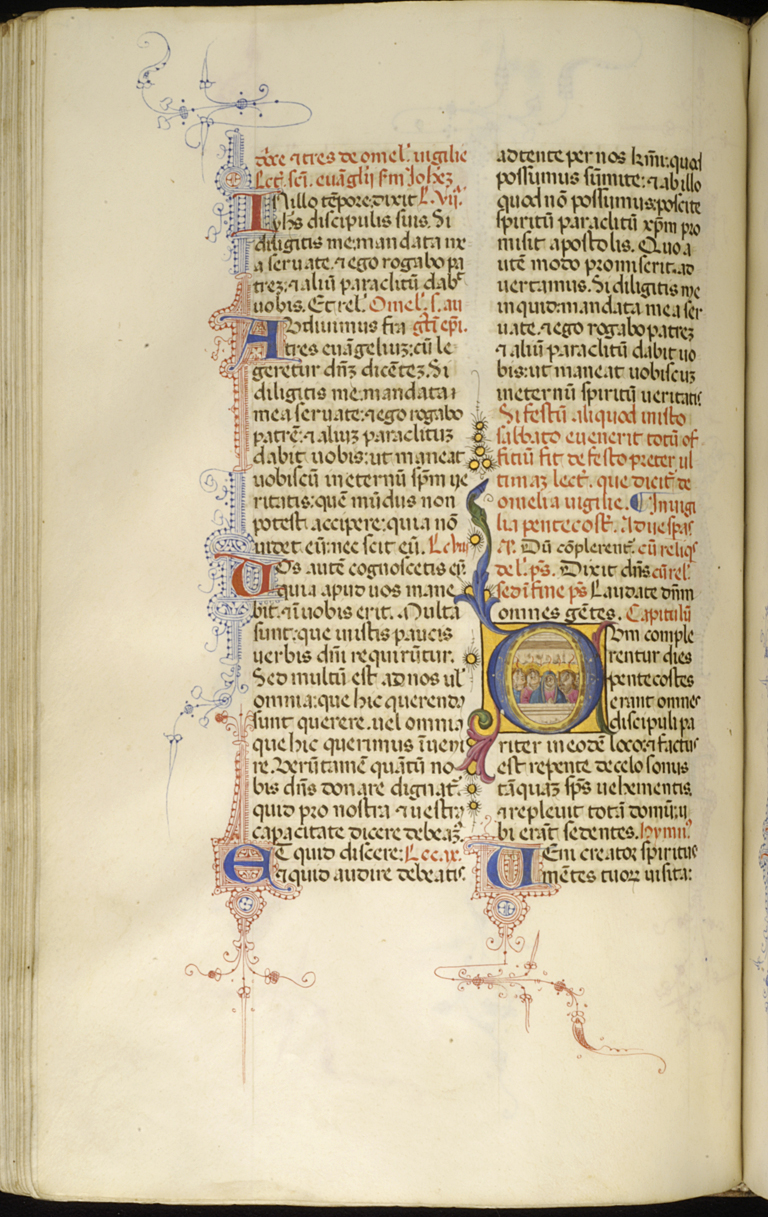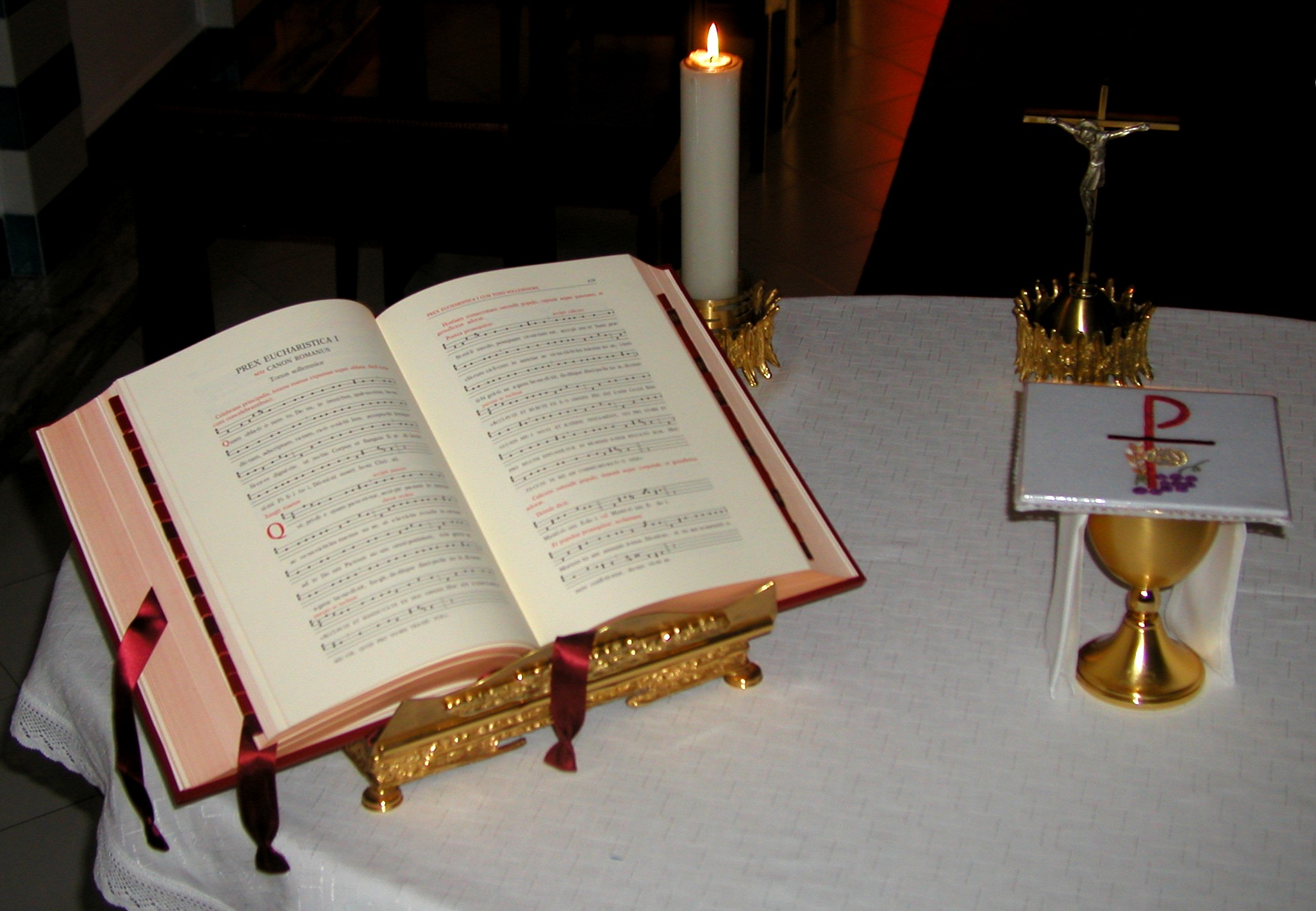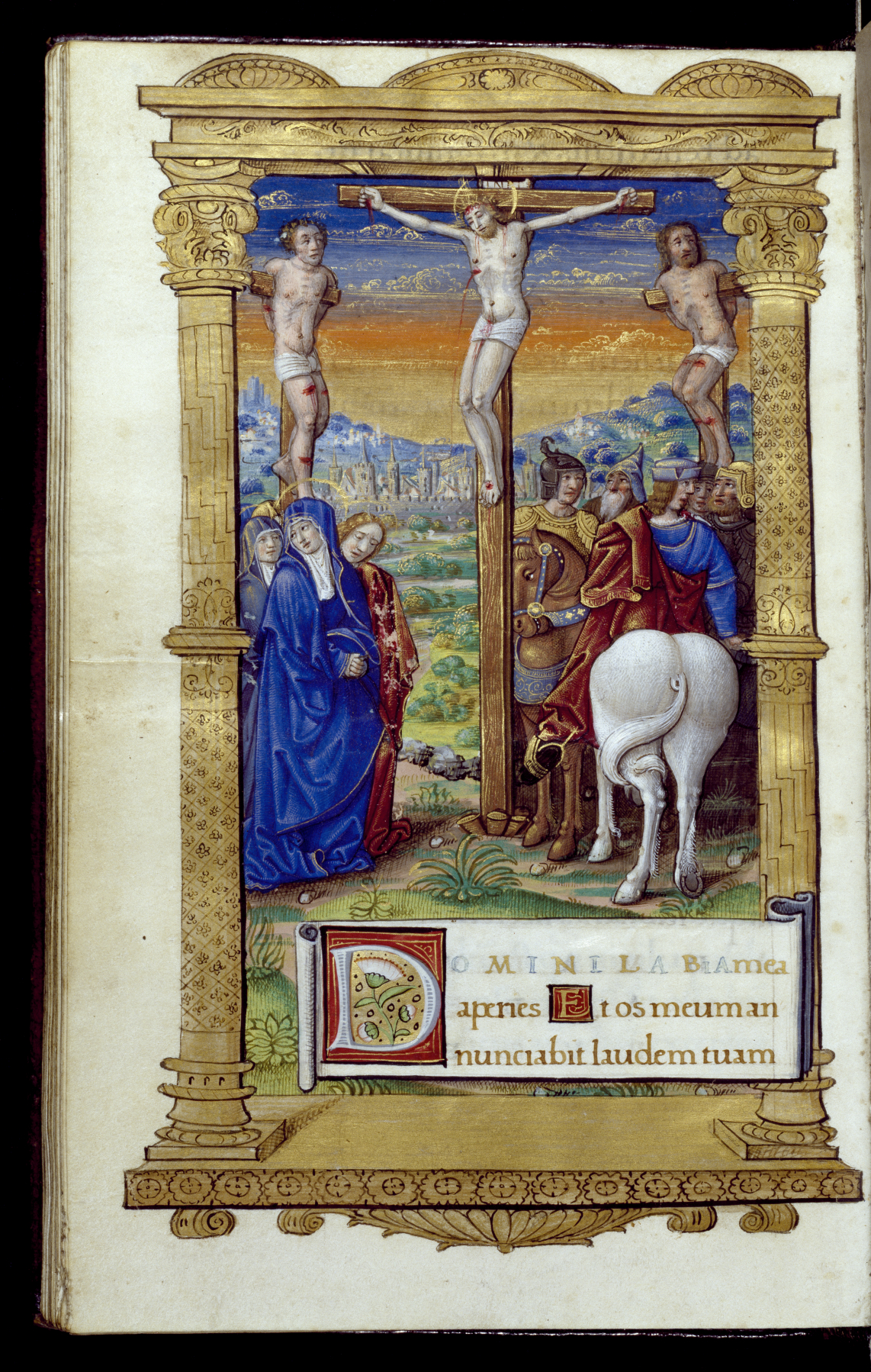|
Antiphonal
An antiphonary or antiphonal is one of the liturgical books intended for use (i.e. in the liturgical choir), and originally characterized, as its name implies, by the assignment to it principally of the antiphons used in various parts of the Latin liturgical rites. Medieval antiphonaries varied with regional liturgical tradition. In 1570, following the Council of Trent, the Roman Rite antiphonary was declared universal. The Roman Antiphonary (''Antiphonale Romanum'') contains the chants for the canonical hours for the hours of Lauds, Prime, Terce, Sext, None, Vespers and Compline for every day of the year. The ''Vesperale Romanum'' is an excerpt of the Antiphonary containing the chants sung at Vespers. The music for use at the Mass is contained in the Roman Gradual (''Graduale Romanum''), the chants of the ordinary are also edited as an excerpt from the Gradual, the ''Kyriale Romanum''. The ''Antiphonale Romanum'' was substantially revised in 1910–11 in the course of the ... [...More Info...] [...Related Items...] OR: [Wikipedia] [Google] [Baidu] |
Gregorian Chant
Gregorian chant is the central tradition of Western plainsong, plainchant, a form of monophony, monophonic, unaccompanied sacred song in Latin (and occasionally Greek language, Greek) of the Roman Catholic Church. Gregorian chant developed mainly in western and central Europe during the 9th and 10th centuries, with later additions and redactions. Although popular legend credits Pope Gregory I with inventing Gregorian chant, scholars believe that he only ordered a compilation of melodies throughout the whole Christian world, after having instructed his emissaries in the Schola cantorum, where the Neume, neumatical notation was perfected, with the result of most of those melodies being a later Carolingian synthesis of the Old Roman chant and Gallican chant. Gregorian chants were organized initially into four, then eight, and finally 12 mode (music), modes. Typical melodic features include a characteristic Ambitus (music), ambitus, and also characteristic intervallic patterns relat ... [...More Info...] [...Related Items...] OR: [Wikipedia] [Google] [Baidu] |
Gradual
The gradual ( or ) is a certain chant or hymn in liturgical Christian worship. It is practiced in the Catholic Mass, Lutheran Divine Service, Anglican service and other traditions. It gets its name from the Latin (meaning "step") because it was once chanted on the step of the ambo or altar. It is customarily placed after a reading of scripture. In the Tridentine Mass, it is sung after the reading or chanting of the epistle and before the Hallelujah, or, during penitential seasons, before the tract. In the Mass of Paul VI, the gradual is usually replaced with the responsorial psalm. Although the Gradual remains an option in the Mass of Paul VI, its use is extremely rare outside monasteries. The gradual is part of the proper of the Mass. A gradual can also refer to a book collecting all the musical items of the Mass. The official such book for the Roman Rite is the Roman Gradual (). Other such books include the Dominican Gradual. History The Gradual, like the Halle ... [...More Info...] [...Related Items...] OR: [Wikipedia] [Google] [Baidu] |
Pope Pius X
Pope Pius X (; born Giuseppe Melchiorre Sarto; 2 June 1835 – 20 August 1914) was head of the Catholic Church from 4 August 1903 to his death in August 1914. Pius X is known for vigorously opposing Modernism in the Catholic Church, modernist interpretations of Ten Commandments in Catholic theology, Catholic doctrine, and for promoting liturgical reforms and Thomism, Thomist scholastic theology. He initiated the preparation of the 1917 Code of Canon Law, the first comprehensive and systemic work of its kind, which would ultimately be promulgated by Pope Benedict XV, his successor. He is venerated as a saint in the Catholic Church. Pius X was devoted to the Blessed Virgin Mary under the Marian title, title of Our Lady of Confidence; while his papal encyclical ''Ad diem illum'' took on a sense of renewal that was reflected in the motto of his pontificate. He advanced the Liturgical Movement by formulating the principle of ''participatio actuosa'' (active participation of the ... [...More Info...] [...Related Items...] OR: [Wikipedia] [Google] [Baidu] |
Introit
The Introit () is part of the opening of the liturgical celebration of the Eucharist for many Christian denominations. In its most complete version, it consists of an antiphon, psalm verse and '' Gloria Patri'', which are spoken or sung at the beginning of the celebration. It is part of the '' proper'' of the liturgy: that is, the part that changes over the liturgical year. In the Roman Rite of the Catholic Church it is known as the ''antiphona ad introitum'' (Entrance antiphon), as in the text for each day's Mass, or as the ''cantus ad introitum'' (Entrance chant) as in the General Instruction of the Roman Missal, 47 and the First Roman Ordo (sixth to seventh century).Fortescue, A. (1910)"Introit" ''The Catholic Encyclopedia''. Retrieved 2 May 2009 In pre-1970 editions of the Roman Missal, the word ''Introitus'' was used, distinguished from the normal meaning of the word (entrance) by being capitalized. In Ambrosian chant and Beneventan chant, the counterpart of the Introit is ... [...More Info...] [...Related Items...] OR: [Wikipedia] [Google] [Baidu] |
Roman Breviary
The Roman Breviary (Ecclesiastical Latin, Latin: ''Breviarium Romanum'') is a breviary of the Roman Rite in the Catholic Church. A liturgical book, it contains public or canonical Catholic prayer, prayers, hymns, the Psalms, readings, and notations for everyday use, especially by bishops, priests, and deacons in the Divine Office (i.e., at the canonical hours, the Christians' daily prayer). The volume containing the daily hours of Catholic prayer was published as the ''Breviarium Romanum'' (Roman Breviary) from its ''editio princeps'' in 1568 under Pope Pius V until the reforms of Paul VI (1974), when replaced by the Liturgy of the Hours. In the course of the Catholic Counter-Reformation, Pope Pius V (r. 1566–1572) imposed the use of the Roman Breviary, mainly based on the ''Breviarium secundum usum Romanae Curiae'', on the Latin Church of the Catholic Church. Exceptions are the Benedictines and Dominican Order, Dominicans, who have breviaries of their own, and two surviving ... [...More Info...] [...Related Items...] OR: [Wikipedia] [Google] [Baidu] |
Roman Missal
The Roman Missal () is the book which contains the texts and rubrics for the celebration of the Roman Rite, the most common liturgy and Mass of the Catholic Church. There have been several editions. History Before the Council of Trent (1570) Before the high Middle Ages, several books were used at Mass: a Sacramentary with the prayers, one or more books for the Scriptural readings, and one or more books for the antiphons and other chants. Gradually, manuscripts came into being that incorporated parts of more than one of these books, leading finally to versions that were complete in themselves. Such a book was referred to as a ''Missale Plenum'' (). In 1223 Saint Francis of Assisi instructed his friars to adopt the form that was in use at the Papal Court (''Rule'', chapter 3). They adapted this missal further to the needs of their largely itinerant apostolate. Pope Gregory IX considered, but did not put into effect, the idea of extending this missal, as revised by the Francis ... [...More Info...] [...Related Items...] OR: [Wikipedia] [Google] [Baidu] |
Triduum
A triduum (; ) is a religious observance that lasts three days. Major tridua The best-known and most significant example today is the liturgical Paschal Triduum (the three days from the evening of Maundy Thursday to Easter Sunday). Other liturgical tridua celebrated in Western Christianity include the Rogation Days preceding Ascension Thursday, the feasts of Christmas and Pentecost together with the first two days of their octave, and Allhallowtide that lasts from Halloween to All Souls Day. In Eastern Christianity (both Orthodox and Catholic) the analogues of festive tridua take the form of a major feasts followed by an associated Synaxis. The most publicly celebrated examples are the feast of Epiphany together with its eve and the following day dedicated to Saint John the Baptist, and the Nativity feast with Christmas Eve and the Synaxis of Theotokos. Ecclesiastical approval has been granted for tridua in honour of the Trinity, the Eucharist and Saint Joseph. Tridua a ... [...More Info...] [...Related Items...] OR: [Wikipedia] [Google] [Baidu] |
Versicle
A versicle (from Latin , ) is a short two- or four-line verse that is sung or recited in the liturgy alternating between the celebrant, hebdomadarian or cantor and the congregation. It is usually a psalm verse in two parts. A series of versicles and responses forms the preces. The versicle is sung recitatively on a note with a simple cadence. The opening versicle before the first liturgical hour is ''Lord, open our lips: And we shall praise your name''. In the Liturgy of the Hours, a versicle opens the hour together with the doxology. At the beginning of the Hours, when either this versicle or ''O God, come to our aid'' is recited, everyone makes the sign of the cross. The General Instruction on the Liturgy of the Hours states that the invitatory and the versicle "invite the faithful to sing the praises of God, hear his voice and look forward to the 'Rest of the Lord'". In the Matins or the office of readings versicles lead from the psalmody to the readings; in the L ... [...More Info...] [...Related Items...] OR: [Wikipedia] [Google] [Baidu] |
Chaucer
Geoffrey Chaucer ( ; – 25 October 1400) was an English poet, author, and civil servant best known for '' The Canterbury Tales''. He has been called the "father of English literature", or, alternatively, the "father of English poetry". He was the first writer to be buried in what has since come to be called Poets' Corner, in Westminster Abbey. Chaucer also gained fame as a philosopher and astronomer, composing the scientific '' A Treatise on the Astrolabe'' for his 10-year-old son, Lewis. He maintained a career in public service as a bureaucrat, courtier, diplomat, and member of parliament, having been elected as shire knight for Kent. Among Chaucer's many other works are '' The Book of the Duchess'', ''The House of Fame'', '' The Legend of Good Women'', ''Troilus and Criseyde'', and '' Parlement of Foules''. He is seen as crucial in legitimising the literary use of Middle English when the dominant literary languages in England were still Anglo-Norman French and Latin ... [...More Info...] [...Related Items...] OR: [Wikipedia] [Google] [Baidu] |
The Prioress' Prologue And Tale
''The'' is a grammatical article in English, denoting nouns that are already or about to be mentioned, under discussion, implied or otherwise presumed familiar to listeners, readers, or speakers. It is the definite article in English. ''The'' is the most frequently used word in the English language; studies and analyses of texts have found it to account for seven percent of all printed English-language words. It is derived from gendered articles in Old English which combined in Middle English and now has a single form used with nouns of any gender. The word can be used with both singular and plural nouns, and with a noun that starts with any letter. This is different from many other languages, which have different forms of the definite article for different genders or numbers. Pronunciation In most dialects, "the" is pronounced as (with the voiced dental fricative followed by a schwa) when followed by a consonant sound, and as (homophone of the archaic pronoun '' th ... [...More Info...] [...Related Items...] OR: [Wikipedia] [Google] [Baidu] |








